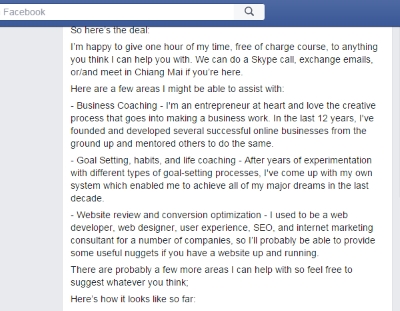Giving First
If you help enough people get what they want, you'll get everything you want. ~ Zig Zigler
A few years back, while exploring the planet on one-way tickets and experiencing so many random acts of kindness, I had a shower-thought:
What if, for a continuous period of time, I helped at least one friend a day through whatever he/she may need, and do so with zero expectations to get anything in return?
What will be the impact?
How will it affect those around me?
Will it inspire others as well?
There was only one way to find out, and that was to add it to my long 10-year life goals list as a 30-day challenge.
I did, and then completely forgot about it.
The Universe Conspires
Earlier this year, my good friend and fellow entrepreneur, Chris Reynolds invited me to be an adviser in his brilliant Entrepreneur House program in Chiang Mai, Thailand.
Although this was on a voluntary basis and there were no actual incentives, I did not think twice and immediately said yes.
Little did I know, however, that my simple “yes” would turn into something so much bigger and that my attitude about giving would change forever.
Within a week of assisting Chris and helping the house's entrepreneurs on daily basis with goal-setting and big-picture planning, it hit me - I could align this with my 30-day giving challenge….
 So I posted the following headline online:
So I posted the following headline online:
“Get one hour of my time and heart for free to support you in whatever way you need”
I added a short simple explanation of what this was all about and left to attend other tasks. Within a few minutes a steady stream of requests started to trickle and by the next day, my calendar filled up.
I was fired up.. This was going to be a fun – and interesting? – experiment
And so it was.
This small 30-day experiment has opened the doors for me in so many ways. I met people who I never would have met otherwise. I gained invaluable insights which I never would have found otherwise, and perhaps more importantly, I connected more deeply with myself, who I want to become, and what I’m here to do.
But before I share some of the insights I gained from the experiment, let's talk a bit more about why it even matters.
3 Types of People
Adam Grant, an influential Wharton professor and author of the best seller “Give and Take”, contends that there are three types of people - givers, takers, and matchers.
Whereas takers strive to get as much as possible from others and matchers aim to preserve an equal balance, givers strive to contribute as much as possible to others without worrying about what they receive in return.
Can you guess which of these three types are LEAST successful?
If you guessed that the givers were at bottom of the success ladder, you'd be right. Across a wide range of occupations, givers achieve the worst results. They often, and not surprisingly, sacrifice their own success and ambitions for the betterment of others.
But here's the interesting bit - which of these three types are MOST successful?
Well, it’s the givers, again. Grant found that, across the board, givers averaged 50% more annual revenue than the takers and matchers.
Hmmm… Interesting, right?
The worst performers and the best performers are givers. What separates the two?
The answer lies in the attributes of the giver in question.
Smart Givers
It turns out there is a clear difference between the attributes and behaviors of a successful giver and an unsuccessful giver who continuously suffer from burnouts and exploitations.
As Grant points out in his book, successful givers are every bit as ambitious as takers and matchers. They just have a different way of pursuing their objectives.
While successful givers mainly focus on acting in the interests of others, they also remain assertive about their own goals and interests. They set healthy boundaries around their time in order conserve energy and increase their capacity to give.
The most successful givers are also conscious about their energy. When dealing with someone who is primarily self-serving (aka “Taker”), they know how to back down and immerse their assertiveness when necessary.
This brings up an important question: how do we spot a taker, and especially when they’re in a Giver’s Clothes…?
Spotting a Taker
The following quote by Samuel Johnson probably best summarizes the difference between a taker in a giver’s clothes and a true giver:
“The true measure of a man is how he treats someone who can do him absolutely no good.”
While takers are primarily obsessed with making a good impression on Influential people, givers don’t worry about hierarchies.
They don’t just do unrequested favors to those who are “above” them in their social and professional worlds so they would feel compelled to reciprocate - true givers give wholeheartedly when the occasion arises, even if it does not seem to benefit them.
But it does. Eventually anyway.
Nice Guys DO Finish First
When it comes to developing meaningful business and personal relationships, the popular adage 'Nice Guys Finish Last' is more of a cliché than helpful guidance.
In the long run, being altruistic and generous work far better than the alternatives.
Here’s why:
Giving creates social capital, which, in turn, stimulates and attracts more support and further giving down the road.
It's in our very human nature to want to reciprocate. When we are given first, we naturally feel compelled to give back and return the favor.
As a result of that, and even though those payoffs are not the motivating engine, true givers tend to build stronger, broader, and more trustful relationships.
Not only that, thanks to our highly connected and technological world, our reputation as value-givers can travel far and fast.
These days, more than ever, you never quite know how what you 'put out there’ is going to show up.
As it did in my case.
It Pays to be a Nice Guy
A few days after my 30-day giving challenge ended, a message landed in my inbox:
“Hey Tal, I’m leaving my villa Friday morning, so I'd love to have you over before”
 I’ve just arrived to Bali and Thibault, a business owner from France whom I've been giving a couple of free one-on-one sessions just a few weeks before and who owns a property on the island, suggested we meet up again at his property.
I’ve just arrived to Bali and Thibault, a business owner from France whom I've been giving a couple of free one-on-one sessions just a few weeks before and who owns a property on the island, suggested we meet up again at his property.
Little did i know, however, that his property was one of the most luxurious villas on the island, with a private chef, gym, cinema, and a 33 meters long infinity pool overlooking the sea.
Generosity begets generosity. My experience after spending 24 hours at Thibault’s Villa was "Heaven on Earth".
And that was only one example. During, immediately after, and within the following days of my challenge I've been treated with generosity and giving from every corner.
People invited me to their homes, referred clients to me, and kindly gave testimonials for my coaching sessions without me asking.
Like this one for example:
It does pay to be a nice guy.
What about you?
What if you launched your own personal generosity experiment?
What if, for __ days, you devote one-hour-a-day to help a friend in whichever way you can with no expectation to get anything in return.
You can offer a free advice in your respective field of expertise
You can introduce someone to a friend who you think might help them
You can share someone’s work on social media
You can provide a one-hour coaching session
You can help funding a project
You can ___________ ...
Now, what if we ALL did that?
That can create a ripple effect, affecting others on a wider scale.
As the venture capitalist Randy Komisar one said, “It’s easier to win if everybody wants you to win.”
Final Words
The world is changing.
Success, nowadays, is not just dependent on skill, talent, and hard work. In our highly inter-connected world, success relates to and is a consequence of how well we interact with others.
Through giving first, we are not only able to demonstrate our unique skills and talents but also to create opportunities for value to flow to us and to others - opportunities that would not have otherwise been available...
Here's how I like to look at it:
Every time we meet another individual, we get to make a choice: We can either try to squeeze as much value as we can out of them or alternatively, we can add value to their life without any expectations of what we'll get back.
What choice will you make?
* To gain more inspiration and motivation for your personal growth journey, I recommend visiting my SMART goals page, which offers a wide range of goal ideas to help you establish new aspirations and achieve greater success in life. This list was crucial in the development of my own life goals list, consisting of 100 goals that I pursued for ten years.
Chief Editor
 Tal Gur is an author, founder, and impact-driven entrepreneur at heart. After trading his daily grind for a life of his own daring design, he spent a decade pursuing 100 major life goals around the globe. His journey and most recent book, The Art of Fully Living, has led him to found Elevate Society.
Tal Gur is an author, founder, and impact-driven entrepreneur at heart. After trading his daily grind for a life of his own daring design, he spent a decade pursuing 100 major life goals around the globe. His journey and most recent book, The Art of Fully Living, has led him to found Elevate Society.


















